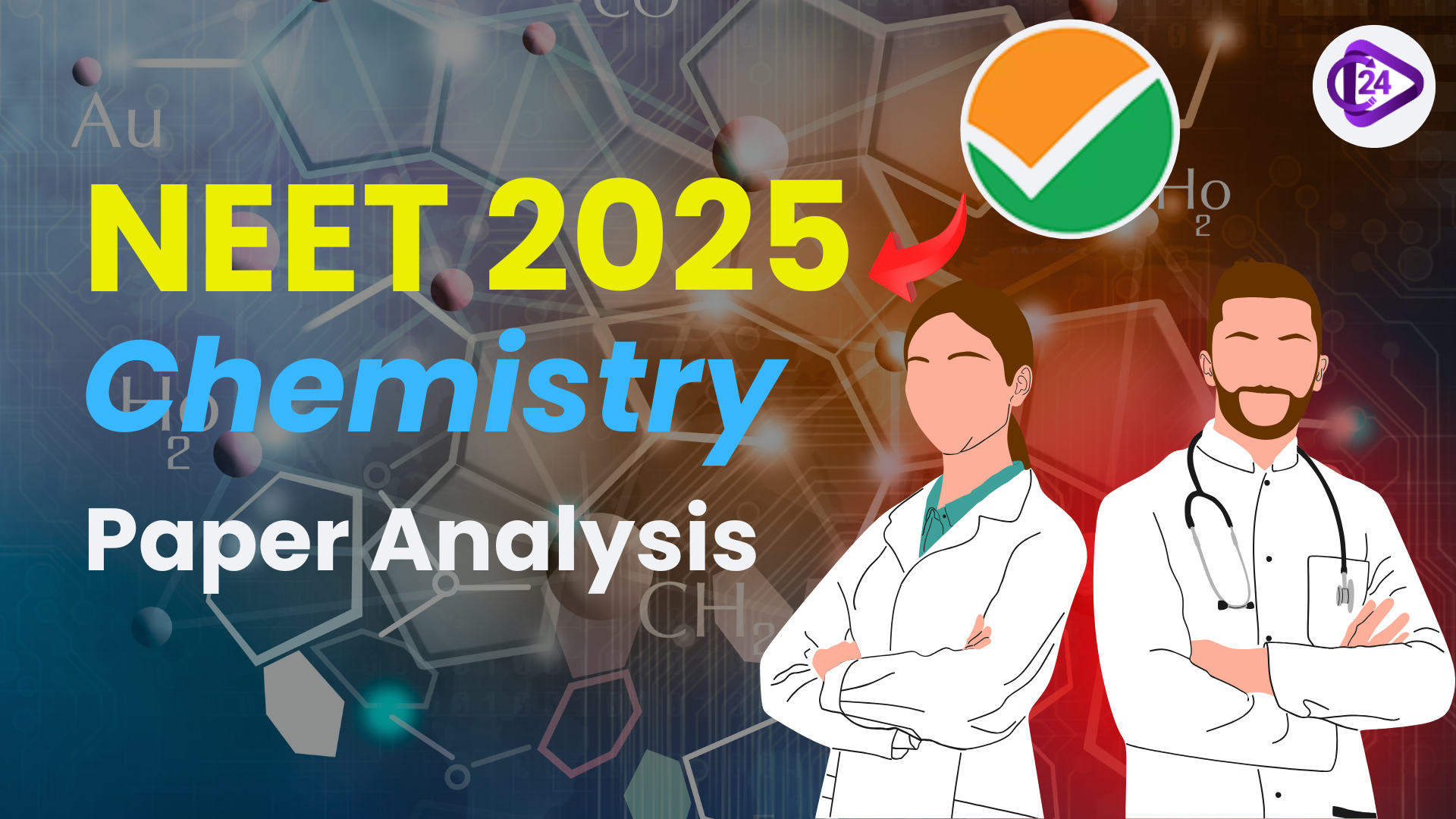Daily Quizzes
Mock Tests
No tests attempted yet.
Select Category
Get in Touch with Class24 for All Your Needs!
The NEET 2025 Chemistry Paper Analysis gives a detailed concept-based overview of the Chemistry section in the NEET 2025 exam, including its structure, trends, and difficulty level. The NEET 2025 Chemistry paper held on May 4, 2025, was formatted to ascertain the level of understanding of students and the application of respective NCERT syllabus topics. The paper consisted of three sections. There was a balanced number of questions contributed by Physical Chemistry, Organic Chemistry, and Inorganic Chemistry. The paper prepared a combination of easy and knowledge application type questions, which made the overall difficulty level medium but required students to prove a wider perceived knowledge.

In this NEET 2025 Chemistry Paper Analysis, we intend to help future aspirants by getting into the details of the chapter-wise distribution, the difficulty level of the questions, and some key trends. By understanding the structure of the exam and the kinds of questions, students can design their preparation strategy accordingly. This analysis should prove helpful whether you are doing revision or setting up your study approach for future exams, because of the actionable tips that will help you to perform better in the Chemistry section of NEET 2025.
Overview of NEET 2025 Chemistry Paper
The NEET 2025 Chemistry paper of May 4, 2025, was of normal difficulty level. This included 90 questions split up evenly between Physical, Organic, and Inorganic Chemistry. Most of the questions were direct from the NCERT syllabus stress laid on the understanding and the application of the concepts. Some questions were easy to answer, and other questions demanded analytical thought and problem-solving skills. As another complexity, the paper had a mix of question types, such as multiple choice, Assertion Reasoning and Matrix Match.
NEET 2025 Chemistry Paper Details
| Aspect | Details |
|---|---|
| Total Questions | 90 (30 from each section: Physical, Organic, and Inorganic Chemistry) |
| Difficulty Level | Moderate |
| Question Types | Multiple-choice questions, Assertion-Reasoning, Matrix-Match, Statement-based questions |
| Class-wise Distribution | Class 11: 21 questions (47%), Class 12: 24 questions (53%) |
| Conceptual Focus | Emphasis on application-based questions requiring a deep understanding of concepts |
| Time Management | Lengthy questions increased time pressure, requiring careful reading and analysis |
Key Highlights of NEET 2025 Chemistry Paper
The NEET 2025 Chemistry paper had an appropriate mix of questions from Physical Chemistry, Organic Chemistry, and Inorganic Chemistry. The difficulties ranged from moderate to hard; a lot of attention was paid to Organic Chemistry, Hydrocarbons, and Aldehydes. The questions in the paper comprised multiple choice, assertion reasoning, and matrix match types, which required students to apply conceptual knowledge over different topics. It tested the theoretical knowledge as well as problem-solving skills.
NEET 2025 Chemistry Paper Highlights
| Aspect | Details |
|---|---|
| Total Questions | 90 questions (30 from each section: Physical, Organic, and Inorganic Chemistry) |
| Difficulty Level | Moderate with a balance of easy, medium, and difficult questions |
| Key Topics | Organic Chemistry: Hydrocarbons, Aldehydes, Ketones, Carboxylic Acids. Physical Chemistry: Thermodynamics, Chemical Kinetics, Solutions. Inorganic Chemistry: p-block, Coordination Compounds |
| Conceptual Focus | Emphasis on understanding and applying key concepts across all sections |
| Key Challenging Areas | Organic Chemistry (Hydrocarbons, Aldehydes, and Ketones), Inorganic Chemistry (Coordination Compounds, p-block) |
Chapter-Wise Analysis of NEET 2025 Chemistry
NEET 2025 Chemistry contains 90 questions divided into three equal parts of Physical, Organic, and Inorganic chemistry. The questions were distributed so some chapters supply more questions than others. Knowing the weightage according to the chapter is essential for students to learn important concepts for enhanced preparation, as it helps them concentrate on the high-weightage chapters to get maximum scores. The following analysis gives us the average number of questions and the percentage weightages for each chapter.
NEET 2025 Chemistry Chapter-wise Distribution
| Chapter | Average No. of Questions | Weightage (%) |
|---|---|---|
| Chemical Bonding | 4 | 8% |
| p-block Elements | 3 | 6% |
| Periodic Table & Periodicity in Properties | 2 | 4% |
| Hydrogen | 1 | 2% |
| s-block Elements | 1 | 2% |
| Coordination Compounds | 2 | 5% |
| d-block & f-block Elements | 2 | 3% |
| Metallurgy | 1 | 2% |
| Qualitative Analysis | 1 | 2% |
| General Organic Chemistry | 2 | 4% |
| Hydrocarbons | 2 | 3% |
| Aromatic Compounds | 3 | 6% |
| Haloalkanes, Alkyl Halides, Alcohols & Ethers | 2 | 3% |
| Biomolecules, Polymers | 2 | 3% |
| Carbonyl Compounds | 2 | 3% |
| IUPAC & Isomerism | 2 | 3% |
| Aldehydes, Ketones, and Carboxylic Acids | 2 | 3% |
| Organic Compounds Containing Nitrogen | 2 | 3% |
| Chemistry in Everyday Life, Environmental Chemistry | 2 | 3% |
| Mole Concept | 2 | 5% |
| Ionic Equilibrium | 2 | 4% |
| Atomic Structure & Nuclear Chemistry | 1 | 2% |
| Chemical Equilibrium, Gaseous State | 1 | 2% |
| Thermodynamics and Thermochemistry | 1 | 2% |
| Redox Reactions | 1 | 2% |
| Chemical Kinetics | 2 | 4% |
| Solution & Colligative Properties | 2 | 4% |
| Electrochemistry | 1 | 3% |
| Solid State | 1 | 2% |
| Surface Chemistry | 1 | 2% |
Important Topics to Focus on for NEET 2025 Chemistry
The exam for NEET 2025 will have Chemistry as an important subject, and it will have a huge impact on the final score. A strategic method involves choosing high-weightage chapters that have been repeatedly asked in previous years. The syllabus for Class 11 and Class 12 have important topics that need to be practiced thoroughly. Therefore, by focusing on these key areas, conceptual clarity and, therefore, increased performance in the exam are achieved.
NEET 2025 Chemistry Chapter Importance
| Chapter | Subject | Importance |
|---|---|---|
| Chemical Bonding and Molecular Structure | Inorganic | Fundamental concepts; high weightage in NEET exams. |
| Thermodynamics | Physical | Core topic: frequently tested in various forms. |
| Equilibrium (Chemical & Ionic) | Physical | Essential for understanding reaction dynamics; high scoring potential. |
| Aldehydes, Ketones, and Carboxylic Acids | Organic | Major focus area: direct questions often asked. |
| Hydrocarbons | Organic | Basic concepts; frequently tested in NEET exams. |
| Coordination Compounds | Inorganic | High weightage; critical for scoring well. |
| p-block Elements | Inorganic | Important for conceptual understanding; moderate weightage. |
| Chemical Kinetics | Physical | Conceptual depth required; moderate weightage. |
| Electrochemistry | Physical | Important for understanding redox reactions; moderate weightage. |
| Biomolecules | Organic | High scoring potential; direct questions are often asked. |
Difficulty Level of NEET 2025 Chemistry
The NEET 2025 Chemistry paper was moderate in difficulty, most felt. Even though many questions were on par with the NCERT syllabus, some demanded a more robust depth of concept and application. A good mix of easy, moderately difficult, and difficult questions, with an application-based and analytical flavor predominating, was seen in the paper. The greater emphasis on concept questions from memory began to present challenges to students who had memorized instead of learned. Generally, the Chemistry section requires you to have a solid understanding of concepts and stay on top of your time.
NEET 2025 Chemistry Question Distribution
| Subject | Easy | Medium | Hard | Grand Total |
|---|---|---|---|---|
| Chemistry | 11 | 19 | 15 | 45 |
Strategies for NEET 2025 Chemistry Preparation
To master NEET 2025 Chemistry, you have to have a planned and disciplined way of going about things. Chemistry comprises three main sections: Physical, Organic, and Inorganic Chemistry. Every section needs to be prepared and practiced for and revised. The following are the strategies for each section below;
- Master Fundamental Concepts: Begin with core topics like the Mole Concept, Thermodynamics, and Chemical Kinetics. These form the foundation for understanding complex problems.
- Understand Reaction Mechanisms: Focus on understanding the mechanisms of reactions rather than rote learning.
- Focus on NCERT: Inorganic Chemistry questions in NEET are predominantly based on NCERT. Ensure thorough reading and understanding of the NCERT textbook.
Conclusion
To succeed in the chemistry section of NEET 2025, the first and foremost thing the students need to do is to be strategic in their preparation, understand the concepts completely, and practice regularly. By mastering the fundamental concepts, practicing problem-solving techniques, and focusing on high-weightage chapters, you can get your confidence back and improve your performance. Each section in Physical, Organic, or Inorganic Chemistry takes a fair bit of tactical work, and repetition will help immensely with solidifying your understanding of things. Time management is key for study as well as in the exam room. Be consistent and focused on your efforts in NEET 2025 Chemistry, and your success is guaranteed.














Your email address will not be published. Required fields are marked *